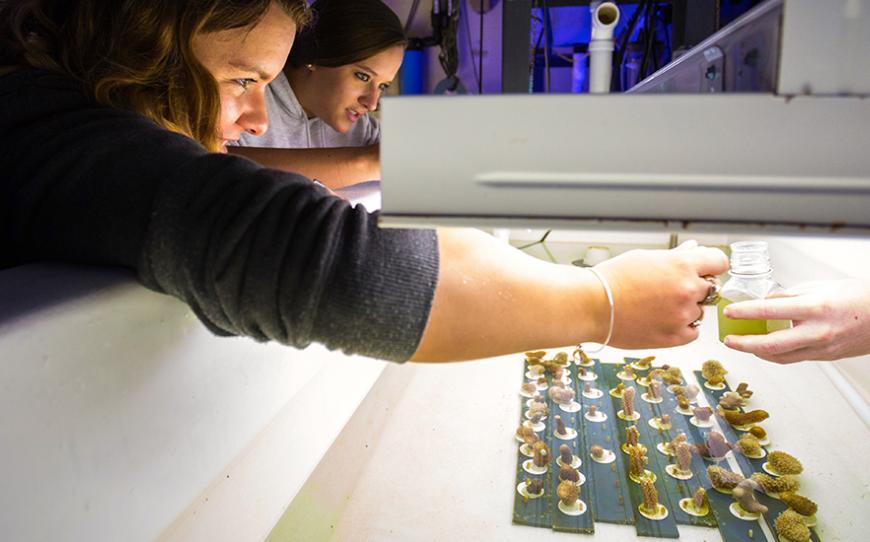The Marine Biology & Ecology degree is a Bachelor of Science degree (BSMAS) and is designed to give students a strong background in biology and quantitative skills, as well as research experience in biomedicine, genomics, evolution, physiology, microbiology, immunology, and ecology. The strength of the Marine Biology & Ecology program is the opportunity for undergraduates to fully participate in the research with Marine Biology and Ecology diverse faculty. These research opportunities provide skills to excel in medicine, graduate school, and other diverse fields.
Application procedure
1. Complete the Common Application
Complete and submit the Common Application. Upon submitting, you will be asked to pay a $70 nonrefundable application fee. Be sure you use the same email address for every part of the application process, including registering for standardized tests.
In the Common Application, you will be asked to respond to one of seven prompts, using 650 words or less. This essay portion of the application gives you the opportunity to demonstrate your ability to develop your thoughts, to communicate them clearly, and to write them concisely conveying your unique voice. We also ask that you list your involvement in extracurricular activities outside of school involvements and/or commitments; these will be evaluated as another factor in the admission process.
2. Send Official High School Transcripts
Review the options below and follow the instructions for the option that describes your educational background.
3. Submitting Test Scores
Review the options below and follow the instructions for the option that describes your educational background.
4. Complete the School Report
The School Report should be completed by your high school guidance counselor and can be found on the Common Application. It is often submitted along with your high school transcript and information about your high school.
5. Submit Letters of Recommendation
We require you to submit two letters of recommendation: one from a high school guidance counselor and one from a teacher. These can be submitted electronically through the Common Application or Naviance, by email to mydocuments@miami.edu, or by mail to one of the following addresses:
6. Submit Educational Activities
If you have a time gap of three months or more during your educational career or from the time you graduated high school to the date of your intended University of Miami enrollment, you must submit an Educational Activities statement explaining the reason for the gap(s) and include the dates. You may provide this explanation within your Common Application or by emailing it to mydocuments@miami.edu. Be sure to include the subject line “Educational Activities” and your full name and date of birth on all correspondence. This information is required to complete your application file.
7. Complete the International Financial Certification Form (International applicants only)
The University of Miami is need-aware for first-year international undergraduate applicants. This means that, for a portion of international applicants, the Admission Committee will consider that student’s ability to pay tuition without the need for financial aid. UM is committed to meeting the full demonstrated financial need of all admitted international students.
All prospective first-year international students who apply for admission to UM must submit an International Financial Certification Form, which can be accessed via CaneLink Full Site after you have submitted your application.
8. Submit Financial Aid Documents
Review the options below and follow the instructions for the option that best applies to you.
9. Send Conduct Updates
If there is an update to your conduct (academic or behavioral) or your standing as a student in your high school (suspension, expulsion, withdrawal, etc.) you must alert the Office of Undergraduate Admission immediately at conductupdate@miami.edu. All other non-conduct updates can be sent to mydocuments@miami.edu. Be sure to include your name and date of birth on all documents.
10. Check Your Application Status
Visit our Check Your Application Status page to learn how to navigate your CaneLink account—your online student portal—to track your application materials and view your admission decision.
Grant opportunities
Incoming Students
UM awards merit-based scholarships to incoming undergraduate students based on their academic achievements. Students are automatically considered for an academic scholarship when they apply for admission to UM.
Learning outcomes
Goals
The MBE departmental major curriculum will provide the rigor, flexibility, depth and integration to enable students to:
- Design their course of study that provides both depth and breadth in marine biology and ecology and science related courses.
- Undertake active research experiences, which will allow them to gain a strong understanding of the scientific process.
- Learn from the diverse and outstanding group of professors, researchers, and classmates.
- Prepare themselves for the public and private sector employment, graduate school, and successful careers.
Student Learning Outcomes
Students completing the MBE departmental major will be able to:
- Master a broad set of fundamental biological knowledge including how to search for, understand, and synthesize primary scientific literature, and understand how fundamental biological principles relate to the marine environment.
- Solve problems competently by identifying the relevant features of the problem and developing a strategy to solve the problem.
- Use computers and computational approaches to acquire and process data as well as use software to analyze data.
- Understand and synthesize the objectives of research experiments, properly conduct experiments, and appropriately record, analyze, and communicate the results.
- Effectively communicate the concepts, results, and implications of their laboratory experiments and independent research both orally and in the written form to experts in the field, scientists in other disciplines, and the general public.
ISCED Categories

